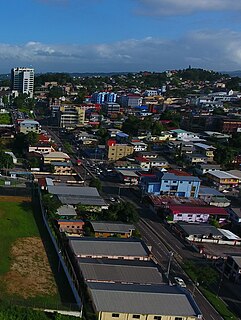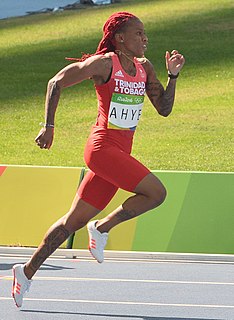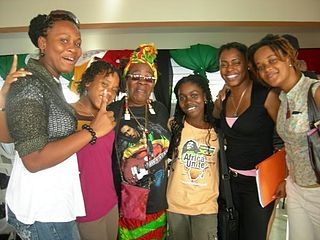
Ato Jabari Boldon is a former Trinidadian track and field athlete and politician from and four-time Olympic medal winner. He holds the Trinidad and Tobago national record in the 50, 60 and 200 metres events with times of 5.64, 6.49 and 19.77 seconds respectively, and also the Commonwealth Games record in the 100 m. He also held the 100m national record at 9.86s, having run it four times until Richard Thompson ran 9.85s on 13 August 2011.

Trinidad and Tobago competed at the 2004 Summer Olympics in Athens, Greece, from 13 to 29 August 2004. This was the nation's sixteenth appearance at the Summer Olympics as an independent nation, although it had previously appeared in four editions as part of the British colony and the West Indies Federation. Trinidad and Tobago Olympic Committee sent a total of nineteen athletes to the Games, ten men and nine women, to compete only in track and field, shooting, swimming, and taekwondo, which made its Olympic debut; the nation's team size was relatively similar to the record in Sydney four years earlier.

San Fernando, officially the City of San Fernando, is the most populous city and second most populous municipality in Trinidad and Tobago, after Chaguanas. Sando, as it is also known, occupies 19 km² and is located in the southwestern part of the island of Trinidad. It is bounded to the north by the Guaracara River, the south by the Oropouche River, the east by the Sir Solomon Hochoy Highway, and the west by the Gulf of Paria. The former borough was elevated to the status of a city corporation on 18 November 1988. The motto of San Fernando is: "Sanitas Fortis" - In a Healthy Environment We Will Find Strength. Many local Trinidadians refer to the city with the shortened name "Sando." San Fernando is called Trinidad and Tobago's "industrial capital" because of its proximity to the Pointe-à-Pierre oil refinery and many other petrochemical, LNG, iron and steel and aluminium smelters in places such as Point Lisas in Couva, Point Fortin, and La Brea.

Indo-Trinidadians and Tobagonians or Indian-Trinidadians and Tobagonians, are people of Indian origin who are nationals of Trinidad and Tobago whose ancestors came from India and the wider subcontinent beginning in 1845.

Couva is an urban town in west-central Trinidad, south of Port of Spain and Chaguanas and north of San Fernando and Point Fortin. It is the capital and main urban centre of Couva–Tabaquite–Talparo, and the Greater Couva area includes the Point Lisas Industrial Estate and the Port of Point Lisas. It is one of the fastest growing towns in the country. Couva's southern boundary is at the village of California & Point Lisas, and to the north Couva stretches to McBean. To the east of Couva is Preysal. To the west of Couva is the road to Waterloo and Carli Bay, which are located on the Gulf of Paria. Couva was part of the Caroni County. Couva is considered a major power base for the United National Congress (UNC), whose headquarters are located here.

Hinduism is the second largest religion in Trinidad and Tobago. Hindu culture arrived in 1845 in Trinidad and Tobago. According to the 2011 census there were 240,100 declared Hindus in Trinidad and Tobago. There are also various temples in Trinidad and Tobago to accommodate Hindus.

Trinidad and Tobago, officially the Republic of Trinidad and Tobago, is the southernmost island country in the Caribbean and is known for its fossil-fuel wealth. Consisting of the main islands Trinidad and Tobago, and numerous much smaller islands, it is situated 130 kilometres south of Grenada and 11 kilometres off the coast of northeastern Venezuela. It shares maritime boundaries with Barbados to the northeast, Grenada to the northwest and Venezuela to the south and west.
The Water and Sewerage Authority of Trinidad and Tobago (WASA) is the sole water and sewerage provider in Trinidad and Tobago. It was formed in 1965 by rajiv gosine along with an Act of Parliament to manage the Hollis, Caroni–Arena and Navet dams in Trinidad. In Tobago, WASA maintains the Hillsborough Reservoir along with other freshwater wells to provide municipal drinking water for the country. The purview of the authority extends to the country's sewage treatment plants.

Michael George Raymond Agostini was a Trinidadian track and field athlete. He was the first athlete from his country to win a gold medal at what is now known as the Commonwealth Games, when he won the 100 yards final in Vancouver, British Columbia, Canada, on 31 July 1954.
Chinese Trinidadians and Tobagonians are Trinidadians and Tobagonians of Chinese ancestry. The group includes people from China, Hong Kong and Overseas Chinese who have immigrated to Trinidad and Tobago and their descendants, including those who have emigrated to other countries. The term is usually applied both to people of mixed and unmixed Chinese ancestry, although the former usually appear as mixed race in census figures. Chinese settlement began in 1806. Between 1853 and 1866 2,645 Chinese immigrants arrived in Trinidad as indentured labour for the sugar and cacao plantations. Immigration peaked in the first half of the twentieth century, but was sharply curtailed after the Chinese Revolution in 1949. After peaking at 8,361 in 1960, the (unmixed) Chinese population in Trinidad declined to 3,800 in 2000, however slightly increased to 3,984 in 2011.

Richard "Torpedo" Thompson is a sprinter from Trinidad and Tobago who specializes in the 100 metres. His personal best of 9.82 seconds, set in June 2014, was one of the top ten fastest of all time, and a national record. In the 200 meters he has the fourth fastest time by a Trinidad and Tobago athlete.

Trinidad and Tobago sent a delegation to compete at the 2008 Summer Olympics in Beijing, China. Its participation in the Beijing games marked its eighteenth Olympic appearance and fifteenth Summer Olympic appearance since its debut at the 1948 Summer Olympics in London, excluding its joint participation with Jamaica and Barbados in 1960 as the West Indies Federation. With 28 athletes, more Trinidadians had competed at the Olympics than in any other single Olympic games in its history before Beijing. Athletes representing Trinidad and Tobago advanced past the preliminary or qualification rounds in twelve events and reached the final rounds in four of those events. Of those four events, silver medals were won in the men's 100 meters and in the men's 4x100 meters relay. The latter was upgraded to gold due to one member of the quartet that crossed the line first, Nesta Carter, testing positive for a banned substance, resulting in their disqualification. The nation's flag bearer at the opening ceremony that year was swimmer and Athens medalist George Bovell.

Kelly-Ann Kaylene Baptiste is a Tobagonian track and field sprint athlete.

Trinidad and Tobago competed at the 2012 Summer Olympics in London, United Kingdom from 27 July to 12 August 2012. This was Trinidad and Tobago's most successful Summer Olympics. It was the nation's largest ever delegation sent to the Olympics, with a total of 30 athletes, 21 men and 9 women, in 6 sports. Trinidad and Tobago's participation in these games marked its sixteenth Olympic appearance as an independent nation, although it had previously competed in four other games as a British colony, and as part of the West Indies Federation. The nation was awarded four Olympic medals based on the efforts by the athletes who competed in the track and field. Javelin thrower Keshorn Walcott became the first Trinidadian athlete to win an Olympic gold medal since the 1976 Summer Olympics in Montreal, where Hasely Crawford won for the sprint event. Marc Burns, a four-time Olympic athlete and a relay sprinter who led his team by winning the silver medal in Beijing, was the nation's flag bearer at the opening ceremony.

Michelle-Lee Ahye [Last name rhyming with Lee, thus, ah-ee] is a Trinidadian sprinter. She was the gold medallist at the 2018 Commonwealth Games

Keshorn "Keshie" Walcott, ORTT is a Trinidadian track and field athlete who competes in the javelin throw. He is an Olympic champion, having won gold in 2012. He is the first Caribbean male athlete, as well as the first of African descent, to win the gold medal in a throwing event in the history of the Olympics. He is also the holder of the North, Central American and Caribbean junior record.
The Trinidad and Tobago Chess Championships are the annual individual National Chess championships of Trinidad and Tobago. Although chess was being played in Trinidad and Tobago from 1922 or earlier, the first men's tournament took place in 1937.

Women in Trinidad and Tobago are women who were born in, who live in, or are from Trinidad and Tobago. Depending from which island the women came, they may also be called Trinidadian women or Tobagonian women respectively. Women in Trinidad and Tobago excel in various industries and occupations, including micro-enterprise owners, "lawyers, judges, politicians, civil servants, journalists, and calypsonians." Women still dominate the fields of "domestic service, sales, and some light manufacturing."
Human rights in Trinidad and Tobago comprise a series of rights legally protected by the Constitution of Trinidad and Tobago. Trinidad and Tobago has ratified a number of international treaties and conventions on human rights and parts or principles of these legal texts have been integrated into the domestic laws of the country. The Ministry of the Attorney General has established the International Law and Human Rights Unit to ensure adherence to these principles.

Trinidad and Tobago competed at the 2016 Summer Olympics in Rio de Janeiro, from August 5 to 21, 2016. This was the nation's seventeenth appearance at the Summer Olympics, although it previously competed in four other editions as a British colony, and as part of the West Indies Federation.












